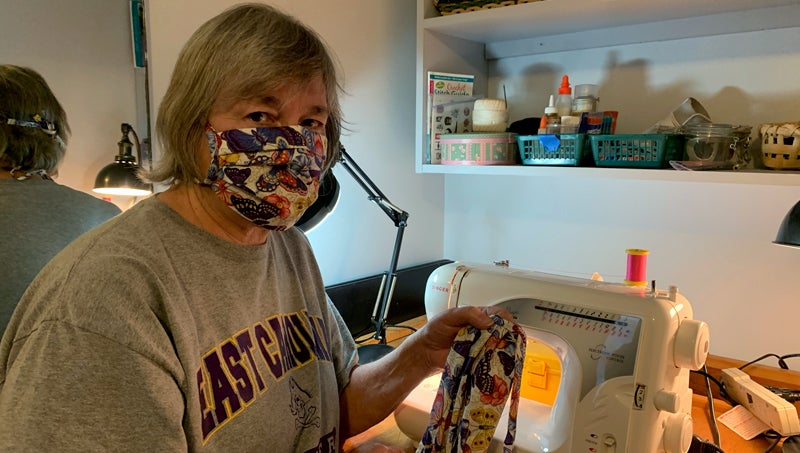Local groups making masks to save lives
Published 7:07 pm Thursday, April 2, 2020

- HOMEMADE PPE: Patty Peebles, a member of First United Methodist Church in Washington and president of the Optimist Club of Washington, sews facemasks that will be used by healthcare workers and first responders. (Patty Peebles)
|
Getting your Trinity Audio player ready...
|
When Becky Tingen’s 27-year-old son, Charlie, came home to Washington from New York City to ride out the COVID-19 pandemic, his time sequestered with his parents sparked an idea.
“We were watching the news and the videos, and finally, he looked at me and said, ‘I feel like we need to be doing something. What can we do?’” Tingen said.
That simple question in turn sparked something bigger. The Tingens, alongside other members of First United Methodist Church in Washington, are now among a growing number of Americans producing homemade personal protective equipment for health care workers. Members of the Pamlico River Quilters’ Guild are chipping in, as well.
“The main objective is to make sure that the hospitals and the other frontline folks in this war have the protection they need, because it’s a problem all over the place,” Tingen said. “We just want to make sure they have a supply of homemade masks if and when they need them. These masks are handmade, and they’re not the proper, approved masks nurses, doctors, firefighters and police really need. But if we can’t get those things, it’s better than nothing.”
On Monday, First United Methodist Church Washington put out a call for local sewing enthusiasts to join the effort. Details can be found online at www.fumcw.com/masks-for-vidant-attention-all-sewing-folks and anyone interested in helping or donating materials can email TingenBecky@gmail.com.
“It gives people a chance to feel like they can do something to help these folks who are out there putting their lives at risk to try and save ours,” Tingen said.
SOMETHING TO HELP
Since the COVID-19 crisis began, the Pamlico River Quilters’ Guild has also found a new priority. Where they usually sew quilts for seniors, infants and others each year, many members are focusing their efforts on making masks, according to guild member Jan Hindsley.
“My whole thing was making cloth masks for veterinarians so they could have some protection and give their N95 (respirators) to medical workers,” Hindsley said. “Then I made a cloth mask that could go over an N95 so that individuals could wash it. The problem is, I’m not sure that it’s blocking enough of the germs to really do what it needs to do.”
Because masks used in medical settings have to meet certain specifications to be effective, Hindsley is taking an extra step to make sure the masks she makes will be useful. She and her fellow quilters are sewing masks with pockets included so that healthcare workers can insert germ-resistant materials that will do the job. All told, she says the guild has a total of 69 members, with quite a few making masks.
“Some of the doctors offices are asking for them, and probably the people who really need them are the people who are sick,” Hindsley said. “I’m not a doctor, I’m not a nurse. I’m just trying to do something to help. … I just don’t want them to get a false idea that this is going to be protecting them from the coronavirus.”
Ultimately, Hindsley and other volunteers seeking to help in the effort are looking for guidance from medical professionals on what type of criteria a mask needs to meet in order to be effective. According to Vidant Health communications staff, the hospital system is working on an updated policy for accepting donations of homemade masks.
“Vidant Health is grateful for the outpouring of support from the community,” reads a statement from the healthcare system. “We are currently working through a process to determine how to utilize the homemade masks that many have donated.”





